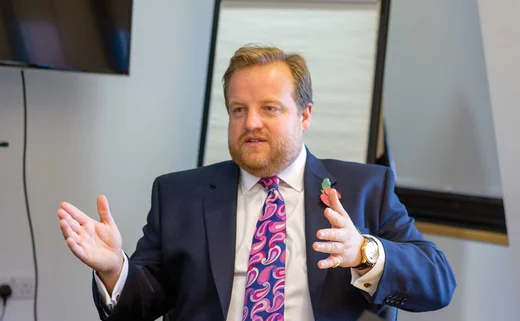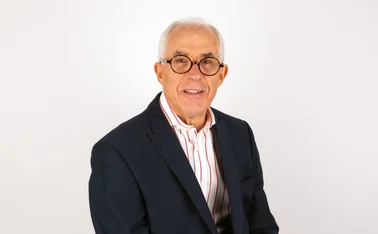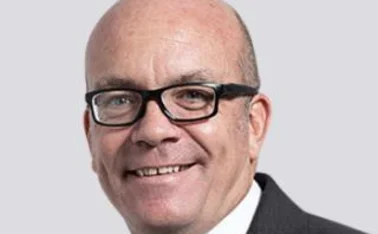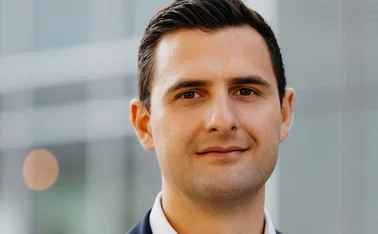
Broking success: Toby Clegg, chief executive officer, Clegg Gifford

Driving growth: Clegg Gifford’s chief executive officer Toby Clegg tells Insurance Age why the branch model and ARs are key to winning and retaining business
▶ How did you step into your current role?
Clegg Gifford is a family business. I tried to break out and do something different, so I joined the Navy after university having being in The Army Reserves.
The experience made me more resilient, resolute, disciplined and determined – it also taught me leadership skills at a young age. I genuinely fancied the life of a happy sailor but I somehow found myself in insurance.
I started off in the traditional route that we put most of our staff through. I trained as a junior broker and then spent some time in the different business areas and eventually went into management.
As part of the succession planning for the business they offered me the role of chief executive in 2014.
▶ What are the origins of Clegg Gifford?
The business was founded in 1968 by Roy Clegg and Mike Gifford in partnership. They had a traditional broking office in Ilford.
This location was chosen because it was smack bang in the middle of the route between Southend and London.
The area was and is still very much entrepreneurial and full of diverse SME businesses and owners. This exposed Clegg Gifford to doing lots of different types of insurance which made us more of a general broker than a specialist broker in one area.
▶ How did growth continue in the early days?
Clegg Gifford went through a period of sustainable growth over the course of many years and opened a number of offices from the tip of the West Country to Scotland.
It became a Lloyd’s broker in the 1990s and moved the business from its original Ilford office to its headquarters in Romford in 2004.
In 2014, we purchased Westminster Insurance, a mutual insurer serving the taxi and Hackney Carriage trade, with its network of appointed representatives (ARs) across the UK, which gave us a wide distribution footprint.
Importantly, it gave us a good link to the individual licencing authorities for taxi.
The way our model works is not to pile it high and sell it cheap but rather work in local areas, establish a good office, a long-standing commitment to the community and the taxi driving associations.
Luckily, taxi driving associations like dealing with humans, which is a good thing still – something that Amazon can’t steal from us at the moment.
▶ How did Westminster help Clegg Gifford to grow?
It has given us a diverse distribution platform. This means we are not overexposed to just one business area.
For instance, if we find that HQ is not getting enough enquires we can get business from the different ARs to bolster income.
We operate in 40 locations between our offices and ARs. Clegg Gifford has all of the branches and Westminster has all of the ARs. We also retained the Westminster brand.
On top of the Westminster purchase, we have been growing the number of brokers that we work with on a wholesale basis that have access into the Lloyd’s market.
▶ What are the main lines of business?
Motor trade. We are market leading experts – we’ve been selling it for 50 years. Motor trade is basically anyone who works on a car, buys and sells, car jockeys, vehicle deliveries, dealers, mechanics and valeters.
We have very good conversations with our motor traders on a direct basis and we have wholesale relationships with customers too.
Other insurance products that we offer include household, travel, marine, cargo liability, fleet and taxi.
▶ What is the most profitable line?
Motor trade is very profitable but is exposed to quite heavy fraud such as ghost broking. For this reason we work with insurers that recognise that we have an expertise in that field.
▶ Why do ghost brokers target motor trade customers?
When insurance premiums are high as they are people will try and inevitably find shortcuts to getting cover. Ghost broking is one of the factors that puts off insurers working in the area – it’s just a risk too far for them. We work well with Zenith and others on that.
▶ What panel of insurers does Clegg Gifford work with?
Our big supporter is Tradex Insurance, which was founded by Roy in 1992. It is a well-known market presence as a niche UK motor carrier. We have a large binding authority with them.
La Parisienne Assurances, which is the oldest taxi insurance company in France, is our next big carrier.
We also use Markerstudy – they are a really nice outfit and you can have a good sensible conversation with them. Their Zenith platform is great.
On the London Market side we use DTW, China Re and Pen Underwriting.
It is a frustration of mine that the risk appetite of some of the composites is just not broad enough to accommodate some of the stuff that we bring to them.
Taxi driving associations like dealing with humans, which is a good thing still – something that Amazon can’t steal from us at the moment

▶ What is your take on unrated insurers?
It is absolutely dependant on where they are regulated and also the security that sits behind their reinsurance platforms.
We do a lot of due diligence on our carriers but this all depends on where they are domiciled.
For instance, if you’re taking the UK and France they have very strong and robust regulatory regimes for Solvency II, there have been no insurer failings in those jurisdictions, unlike in Gibraltar.
With that said, we work very hard in securing rated capacity but it is a very hard process to secure original facilities.
▶ Did you pick up business when Alpha collapsed?
We weren’t affected but had a huge influx of enquires coming in. At the time we were celebrating Westminster’s 70th birthday. Customers told us they wanted to deal with a company that has longevity like Westminster.
▶ How do you feel about regulation?
We were part of the Financial Conduct Authority’s thematic review into ARs and I thought the outcome of the report sent a strong message to the industry about the level of controls that are expected in that space.
A lot of people exited ARs entirely, however, the review acknowledged that we had some good levels of controls in that space. There are always improvements one can make and we do spend a lot of time on compliance.
▶ What is the future for the business?
We are a very organic driven organisation and want to maximise what we do through our ARs and branch networks. The aim is to invest heavily in them over time. We are a human business we are not internet driven and don’t have a call centre mentality.
Clegg Gifford will open potentially two branches this year – in Basildon and the West Country. It is an investment in humans. I am actually heartened to see A-Plan expanding the high street model and we’re doing the same.
▶ Any acquisitions on the horizon?
We are not an organisation that goes for stellar growth numbers – we like to do it on a sustainable basis. I can’t see a great number of opportunities out there and that is what pushes me to believe that there is a huge amount of road left in our own organic growth.
Only users who have a paid subscription or are part of a corporate subscription are able to print or copy content.
To access these options, along with all other subscription benefits, please contact info@insuranceage.co.uk.
You are currently unable to print this content. Please contact info@insuranceage.co.uk to find out more.
You are currently unable to copy this content. Please contact info@insuranceage.co.uk to find out more.
Copyright Infopro Digital Limited. All rights reserved.
You may share this content using our article tools. Printing this content is for the sole use of the Authorised User (named subscriber), as outlined in our terms and conditions - https://www.infopro-insight.com/terms-conditions/insight-subscriptions/
If you would like to purchase additional rights please email info@insuranceage.co.uk
Copyright Infopro Digital Limited. All rights reserved.
You may share this content using our article tools. Copying this content is for the sole use of the Authorised User (named subscriber), as outlined in our terms and conditions - https://www.infopro-insight.com/terms-conditions/insight-subscriptions/
If you would like to purchase additional rights please email info@insuranceage.co.uk
Most read
- Zurich strikes five-year capacity deal with MGA Freedom Services
- Pen inks £150m social housing capacity deal with SiriusPoint
- RSA and NIG brands to become one next year but undecided on name








